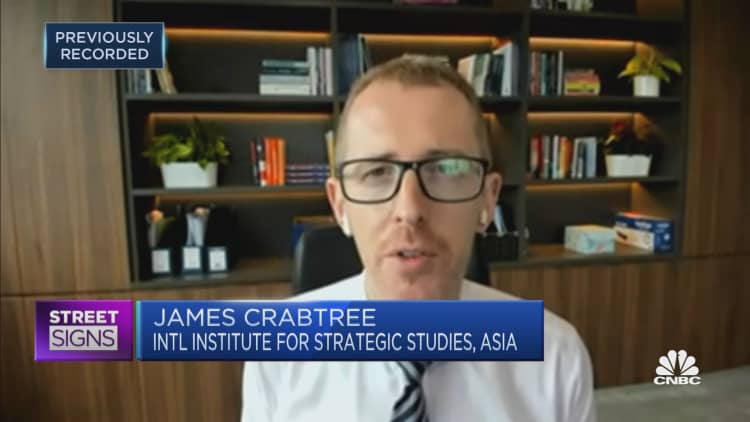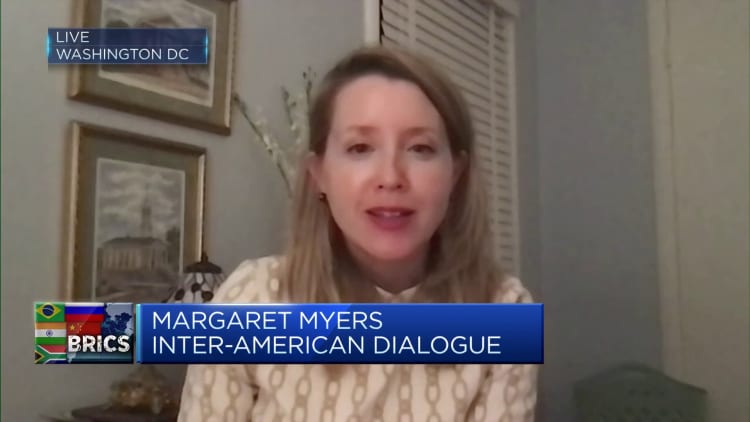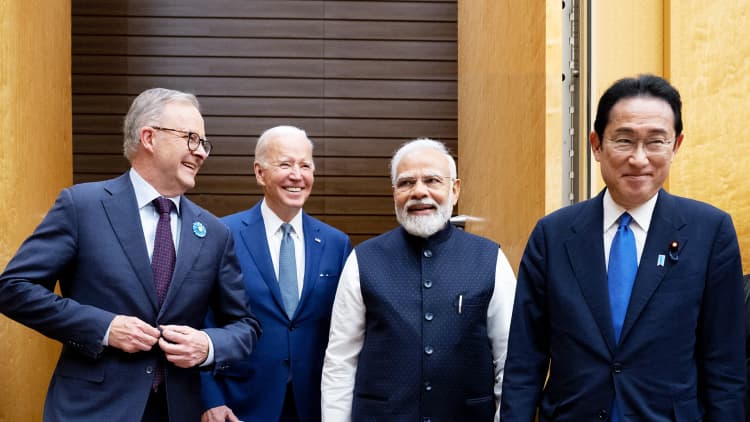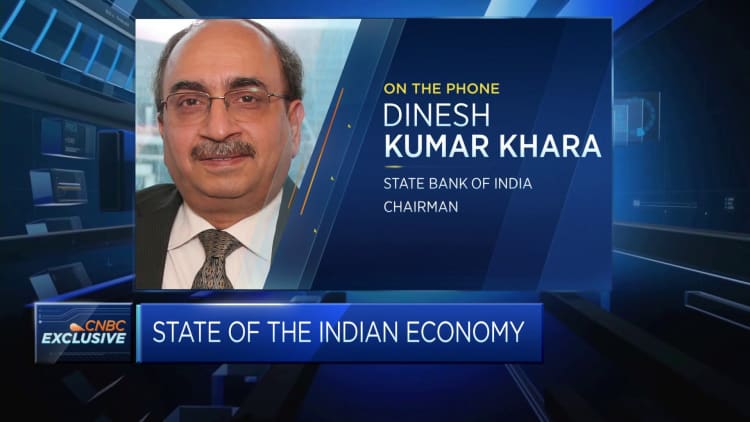Indian Prime Minister Narendra Modi has turned the normally sedate rotating presidency of the Group of 20 nations into a branding vehicle to burnish India's geopolitical importance — underscoring India's emergence as a key voice on the world stage.
The country's diplomats now face a race against time to broker tangible multilateral outcomes at this weekend's G20 leaders' summit in New Delhi that will mark the end of India's year-long presidency of the bloc of leading industrialized and developing economies.
India has so far not been able to foster consensus for a joint communique from the previous G20 meetings in other major tracks that it has convened. Member states haven't been able to agree on binding action due largely to Russia's and China's objections to the language referring to the Ukraine crisis.
In a banner year for Indian diplomacy that also saw the world's most populous nation take on the rotating presidency of Shanghai Cooperation Organization, India risks having little to show for its efforts that may in turn undercut the country's credibility and Modi's domestic messaging.
One of the risks is that by elevating India's presidency of the G20 so much, there are now expectations for India to deliver some concrete breakthroughs.Manjari Chatterjee MillerCouncil on Foreign Relations
"What is different about India's presidency of the G20 and what I'm amazed by is how the Modi government has turned the G20 into a nonstop advertisement for both India and his leadership," said Manjari Chatterjee Miller, a senior fellow for India, Pakistan and South Asia at the Council on Foreign Relations in Washington, D.C.
"One of the risks is that by elevating India's presidency of the G20 so much, there are now expectations for India to deliver some concrete breakthroughs," she told CNBC in an email. "India has been trying to use the G20 to bring the Global South together and offer itself as a bridge between the Global South and the West. But there remains the problem of Russia and China."
With Russian President Vladimir Putin and his Chinese counterpart Xi Jinping sitting out the Sept. 9-10 meeting, the prospect for any real breakthrough appears dim.
Putin has not been known to have traveled out of Russia since the International Criminal Court issued an arrest warrant in March against him and his allies for war crimes in Ukraine.
Russia-Ukraine impasse
Indeed, the specter of Russia's Ukraine invasion has loomed large over G20 meetings for the various tracks that India has convened.
India had hoped to forge consensus on a range of issues from a regulatory framework for cryptocurrencies to the resolution of crippling debt issues for developing countries.
Other areas include reforms in multilateral banks as part of its agenda to foster progress on sustainable development, as well as the admission of the African Union as a member of the G20.
Despite its neutral position on the Ukraine crisis, New Delhi has not been able to broker a single joint statement in any of the key discussion tracks since India took over the G20 presidency in December 2022. Instead, it has only managed non-binding chair's summary and outcome documents.

In fact, Russia disassociated itself from the status of the outcome document in a June meeting on development issues in Varanasi, due to references to the Ukraine war. China said the meeting outcome should not include any reference to the Ukraine crisis.
"The original language was accepted by Russia at the Bali G20 — and Indian diplomats in fact, played a major part in getting Russian acceptance on that," Pramit Pal Chaudhuri, Eurasia Group's head for its South Asia practice, told CNBC in a telephone interview from New Delhi.
"But since then, Russia has hardened its position and joined by China to say that we don't accept the original body language, which is taken from the UN Security Council resolution," he added.
"Last I heard, India is still struggling to get an agreement on what type of language would be acceptable to all 20 countries," Chaudhuri said. "If they fail to bridge that gap, then we may see the failure to issue a joint statement, and there probably won't be an action plan afterwards."
[Modi] is trying to portray this as a great recognition that India has arrived under his under his prime ministership.Pramit Pal ChaudhuriEurasia Group
Russia's Foreign Minister Sergei Lavrov — who is due to represent Russia at G20 leaders' summit in place of Putin — reportedly warned there will be no general declaration at the meeting in New Delhi if Russia's position is not reflected.
The Kremlin insists that its invasion of Ukraine is a "special military operation" in an existential war against the West that's determined to take down Russia.
Domestic setback?
This could well be a setback for Modi's government, which has convened more than 200 G20 meetings in more than two dozens cities across India.
"It's actually quite brilliant and one has to give him and the BJP credit for making an event that is usually elitist and esoteric, and a rotating presidency that is routine into something the whole country can understand and be proud of," CFR's Miller said, referring to Modi's ruling Bharatiya Janata Party.
More than just lining streets with banners and signs that injected plenty of visibility to the various G20 meetings, Modi has also used these meetings to clean up host cities, promote local products and more.
"At the national level, [Modi] is trying to portray this as a great recognition that India has arrived under his under his prime ministership," Eurasia Group's Chaudhuri said. "I think the messaging has been strong, but the reception is harder to work out, it's harder to quantify."
The biggest risk for Modi is the lack of tangible multilateral accomplishment out of the G20 presidency after all that has been done and invested, possibly with an eye on boosting the legacy and standing of his Hindu nationalist BJP after a decade in power and ahead of national elections next year.

Underscoring that wariness, India's Foreign Minister Subrahmanyam Jaishankar was quick to tout the "unanimous support" from G20 member states, for two outcomes that India proposed at the Varanasi G20 ministerial meeting on developmental issues. He even labeled it the "biggest achievement" of India's G20 presidency so far — despite Russia and China abstaining.
"There may be a sort of backlash, or a degree of cynicism may set among voters who say — we have heard a lot — we seem to have spent a lot of money, but nothing really seems to have happened here," Chaudhuri added.
Still, Modi could point to other evidence of India's place as a key global player in a year that saw New Delhi emerge as a strategic U.S. ally in its Indo-Pacific strategy aimed at checking China's might.
India walked the diplomatic tightrope even as China pushed for an expansion of BRICS alliance of developing nations to build support for a broad coalition aimed at challenging U.S. dominance over the global political and economic system.

"India will continue to maintain healthy diplomatic relations with Russia amid an increasing reliance on that country's energy imports," Sumedha Dasgupta, a senior analyst with the Economist Intelligence Unit, told CNBC. Moscow is India's leading source of crude oil.
"Simultaneously, India will develop stronger diplomatic bonds with the US and its allies through means such as the Quad, co-operation on critical technology and defense, which will over time amount to a gradual geopolitical shift," she said in an email.
'Happy coincidence'
Underscoring India's strategic importance, Biden hosted Modi in June in the Indian prime minister's first state visit to the U.S.
Warming India-U.S. ties contrast with India's continued standoff with China.
India — along with Malaysia, the Philippines, Vietnam and Taiwan — sharply rebuked China last week for a new national map that Beijing claims contested territories as its own.
As the U.S. ramps up efforts to limit the transfers of strategic technology to China on grounds of national security, India stands to gain from American companies looking to diversify their supply chains — at China's expense.

In January, India's commerce minister told CNBC that Apple was manufacturing its latest iPhone 14 in the country and aimed to produce 25% of all iPhones in the country.
Apple's efforts to move its assembly of products from China became more urgent in the last few years years as U.S.-China trade tensions intensified, and supply chain disruptions caused by Beijing's zero-Covid policy unraveled.
This development serves to buttress India's burgeoning economic clout, the basis of its greater confidence and assertiveness geopolitically.
It's a happy coincidence for the moment, I think, for India to showcase itself as an improved economy; as an improved place for international investors ... and as an alternative to China.Pravin KrishnaJohns Hopkins University's School of Advanced International Studies
The International Monetary Fund expects India to be the world's fastest growing major economy this year.
In the last decade in power, Modi's BJP has liberalized foreign direct investment policies, invested in infrastructure, pushed for digitalization in the world's fifth-largest economy, along with several other neo-liberal economic policies.
"All of of these things are coming together at the right time, alongside the G20," said Pravin Krishna, a professor of international economics at Johns Hopkins University's School of Advanced International Studies.
"So it's a happy coincidence for the moment, I think, for India to showcase itself as an improved economy; as an improved place for international investors; as an improved platform, potentially for manufacturing; and as an alternative to China, which India has been aspiring to be for a number of years," he added.


